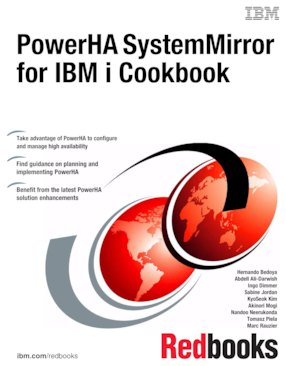
Published on 01 February 2012, updated 30 December 2015
Share this page:
ISBN-10: 0738436364
ISBN-13: 9780738436364
IBM Form #: SG24-7994-00
Authors: Hernando Bedoya, Abdel Ali-Darwish, Ingo Dimmer, Sabine Jordan, KyoSeok Kim, Akinori Mogi, Nandoo Neerukonda, Tomasz Piela and Marc Rauzier
Abstract
IBM® PowerHA™ SystemMirror for i is the IBM high-availability disk-based clustering solution for the IBM i 7.1 operating system.
When combined with IBM i clustering technology, PowerHA for i delivers a complete high-availability and disaster-recovery solution for your business applications running in the IBM System i® environment. PowerHA for i enables you to support high-availability capabilities with either native disk storage or IBM DS8000® or DS6000™ storage servers or IBM Storwize V7000 and SAN Volume Controllers.
The latest release of IBM PowerHA SystemMirror for i delivers a brand-new web-based PowerHA graphical user interface that effectively combines the solution-based and task-based activities for your HA environment, all in a single user interface.
This IBM Redbooks® publication provides a broad understanding of PowerHA for i.
This book is intended for all IBM i professionals who are planning on implementing a PowerHA solution on IBM i.
Table of Contents
Part 1. Introduction and background
Chapter 1. Introduction to PowerHA SystemMirror for i
Chapter 2. Implementing an independent auxiliary storage pool
Chapter 3. IBM i clustering
Chapter 4. PowerHA architecture
Part 2. Concepts and planning
Chapter 5. Geographic Mirroring
Chapter 6. DS8000 Copy Services
Chapter 7. Storwize V7000 and SAN Volume Controller Copy Services
Chapter 8. Planning for PowerHA
Chapter 9. PowerHA user interfaces
Chapter 10. Advanced Copy Services for PowerHA
Part 3. Implementation examples and best practices
Chapter 11. Creating a PowerHA base environment
Chapter 12. Configuring and managing Geographic Mirroring
Chapter 13. Configuring and managing DS8000 Copy Services
Chapter 14. Configuring and managing CSVC/V7000 Copy Services
Chapter 15. Best practices
Appendix A. IBM i data resilience options